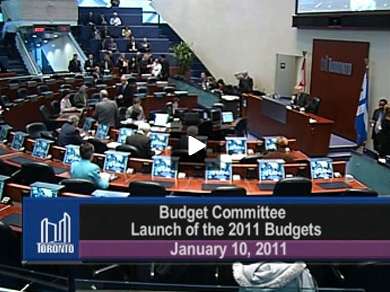
News Release
January 24, 2011
Budget Committee tables continuing tax relief programs in Toronto
A report tabled today at Budget Committee recommended continuing with three programs to assist residents and businesses: the City’s Enhancing Toronto’s Business Climate strategy – lowering business tax rates; property tax assistance for low-income seniors and low-income disabled persons; and support to encourage the development of purpose-built rental properties.
The ‘Enhancing Toronto’s Business Climate’ initiative will reduce the tax ratios for the multi-residential class and the business classes to 2.5-times the residential tax rate by 2020 (a 15 year plan), and provides for an accelerated reduction in tax rates for small businesses, with a target of 2.5-times the residential rate by 2015 (a 10 year plan, instead of the 15 years for the rest of commercial).
The City provides both a Tax Increase Cancellation Program and a Tax Increase Deferral Program for low-income seniors and low-income homeowners with disabilities that meet certain eligibility criteria. Under the Tax Increase Cancellation program, eligible homeowners can have their tax increases, whether related to changes in current value assessment (CVA) or budgetary related, cancelled. Under the Tax Increase Deferral program, eligible homeowners can have their tax increases, whether CVA or budgetary related, deferred without interest, and only repayable once the homeowner becomes no longer eligible (http://www.toronto.ca/taxes/property_tax/tax_relief.htm).
To encourage the development of purpose-built rental properties City staff also recommend continued support to new and existing rental properties by providing a lower tax rate for new multi-residential buildings and by reducing the tax rate on existing multi-residential buildings.
CVA Property Tax Changes
The 2011 phased-in CVA for the residential property class has appreciated on average by 4.9%. A property which appreciates at a rate greater than the class average will experience an increase in tax burden. A property which appreciates at a rate less than the class average will experience a decrease in tax burden (http://www.toronto.ca/finance/tax_policies.htm).
The recommended 2011 Operating Budget assumes a 0% property tax increase. For 2011 the average residential property which is now assessed at $427,177 will continue to pay $2,400.40 in municipal taxes. In 2010, the average residential property assessed at $407,144 for 2010 paid $2,400.40 in taxes, for a net zero increase on the average residential property.
The assessment of all property in Ontario is carried out by the Municipal Property Assessment Corporation (MPAC). The current value assessment, or CVA, of a property is an estimate of the market value of a property at a fixed point in time (the valuation date), or the amount the property would sell for in an open market on a given date (i.e., in an arm’s length sale between a willing buyer and a willing seller).
The report will go to City Council for final approval along with the proposed 2011 budget. To view this report visit: http://app.toronto.ca/tmmis/viewAgendaItemHistory.do?item=2011.BU8.1
Toronto is Canada’s largest city and sixth largest government, and home to a diverse population of about 2.6 million people. Toronto’s government is dedicated to delivering customer service excellence, creating a transparent and accountable government, reducing the size and cost of government and building a transportation city. For information on non-emergency City services and programs, Toronto residents, businesses and visitors can dial 311, 24 hours a day, 7 days a week.
You may also like:
